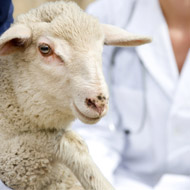Sheep farmers respond to AMR challenge

"To focus our efforts, we need to understand why and when farmers are choosing to use antibiotics" - Phill Stocker, NSA.
The UK’s sheep farming sector has recognised that it cannot be complacent about antibiotic resistance (AMR) and has a role to play in ensuring antibiotic use.
Earlier this year, the National Sheep Association (NSA), AHDB Beef & Lamb and MSD commissioned a survey to reveal where and why antibiotics were being used within sheep farming systems.
Independent sheep specialists from ADAS UK - the UK’s largest independent provider of environmental consultancy - are in the process of analysing results from over 350 farmers with the view to guiding future support and development work.
“The sheep sector is taking antimicrobial use very seriously. We need to play our part in ensuring these medicines continue to be available and effective for both our human and animal populations,” said Phil Stocker, NSA chief executive.
“To focus our efforts, we need to understand why and when farmers are choosing to use antibiotics, so we can steer future work towards increasing vaccination for some conditions and finding alternative solutions to others,” he adds.
AMR is an increasingly serious threat to both human and animal health. In September, Defra committed to reduce the use of antibiotics by 19 per cent over the next four years.
To help the industry achieve this goal, RUMA is helping individual sectors identify specific objectives and ensure more responsible use. This will need the communication and implementation of knowledge and experience, as well as likely investment in farm infrastructure, say the NSA.
Furthermore, MSD Animal Health is working to help sheep producers understand the flock productivity benefits of preventative healthcare.
“The continued focus on reducing the use of antibiotics in farmed livestock means it is vital that the whole UK sheep industry embraces active flock health planning,” said John Atkinson, MSD Animal Health technical manager.
“The continued focus on reducing the use of antibiotics in farmed livestock means it is vital that the whole UK sheep industry embraces active flock health planning. Our aim is to actively support this positive move for the industry by providing a technical advice platform for both vets and sheep farmers that is designed to optimise flock health and performance.”



 The latest
The latest